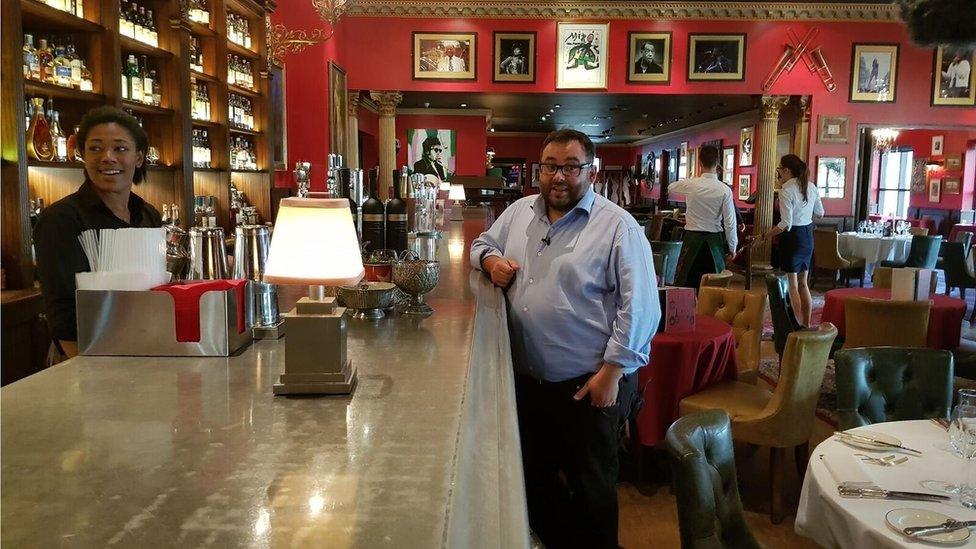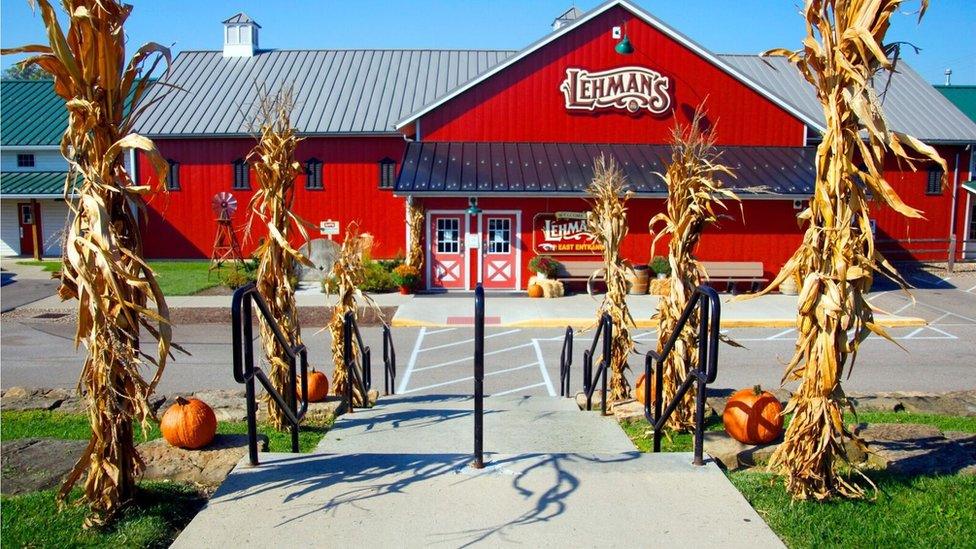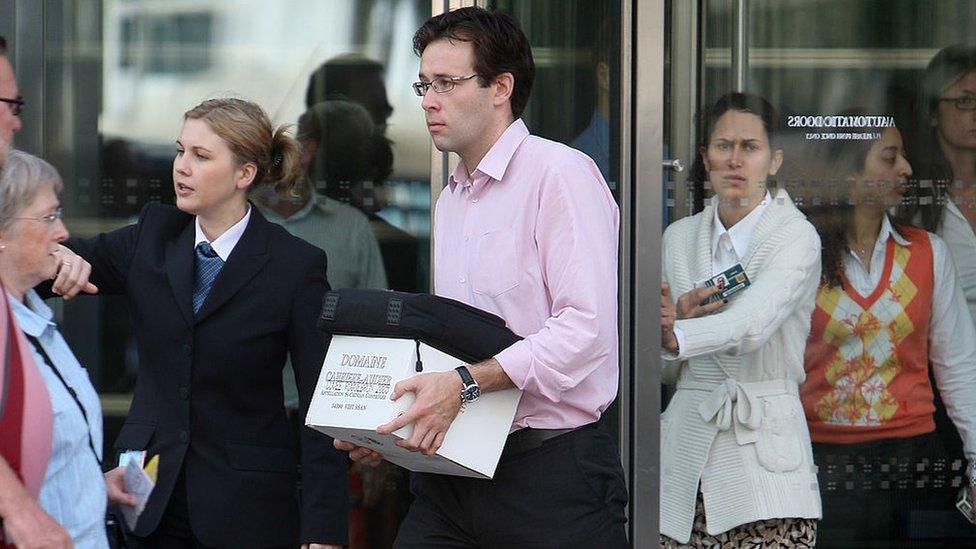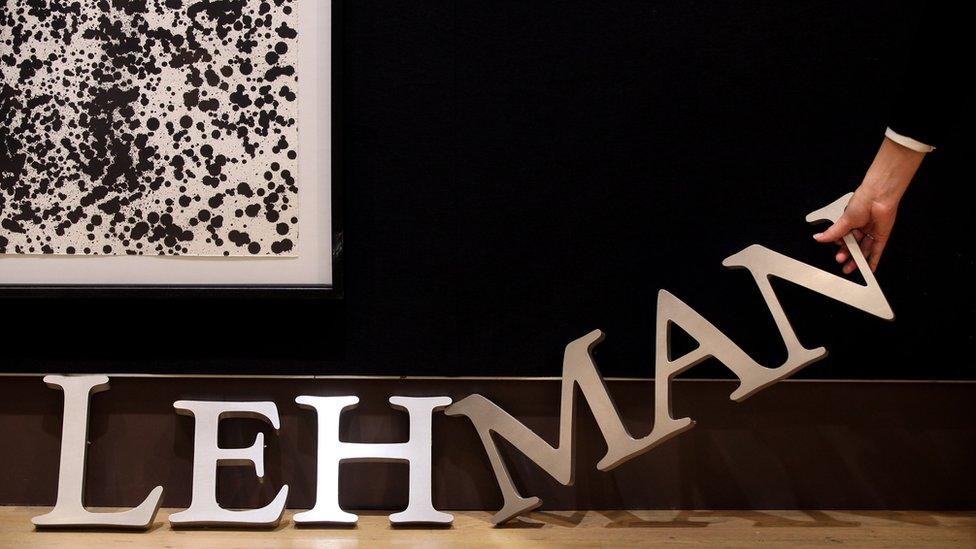The whiskey toasting the demise of Lehman Brothers bank
- Published
Lehman Brothers: Failed bank or malt whisky?
It's the bottle where everybody knows its name, and that is both its biggest asset and its biggest problem. Lehman Brothers is no longer just the bank that defined the global financial crisis of a decade ago, it's now also a range of whiskies.
A London entrepreneur decided that the whole world should be able to taste one of the most profound company collapses in modern times. On 15 September nine years ago 25,000 people lost their jobs when the bank went bankrupt.
James Green says he was inspired to keep the bank's name alive by the significance of those events.
"After living through the economic disaster of 2008, it really resounded with me. I personally related to it, there were people in my neighbourhood, my family that were personally affected by the crash," he says.
He says his three different whiskies, one of which is named Ashes of Disaster, have been specially crafted to capture the flavour of the once mighty bank's fall from grace.

James Green says the whiskies aim to capture the flavour of Lehman Brothers' fall from grace
Getting the right to make them hasn't been a straightforward process.
Barclays Bank fought Mr Green's efforts to register a trademark for the whisky at New York State's Division of Corporations.
It unsuccessfully argued that it controls the Lehman Brothers name as part of the deal it struck to buy many of the bank's assets just after it went into meltdown and that the public would be confused into thinking the whisky was connected to the bank. Barclays declined to comment on the dispute.
Using the Lehman's name to sell whisky is a clever idea according to Rob Malcolm.
The former head of marketing for the world's biggest whisky seller, Diageo, says he thinks "there will be an initial surge of appeal for its cleverness and its fun" but he says "after that's exhausted I'd be very surprised if there's much of a sustaining business there", although he does expect it to make a profit.
Dr Malcolm says that it will have greatest appeal amongst those working in the finance industry who can relate to the Lehman's story. He adds that whisky aficionados are "disproportionately people who are economically successful", such as bankers.

Galen Lehman's eponymous family hardware store was founded in 1955
But for some firms, sharing a name with the collapsed Wall Street firm, has been more of a burden than a benefit.
Since 1955 Galen Lehman's eponymous family hardware store in the US state of Ohio has been selling everything from butter churns to oil lamps and handmade soap.
One of the company's wood stoves even featured in the film Back to the Future III.
But 20 years ago they nearly got burnt by Lehman Brothers, the bank. It tried to stop the hardware store's efforts to become one of the first online retailers, when they registered the website lehmans.com.
Mr Lehman recalls that one of their lawyers called and said: "you can't use that name, that's us", to which he replied: "that's ironic it's me too". Mr Lehman also remembers a similar call in the 1980s.
Despite the problems, some 40% of his business is now done online and over the ensuing years Mr Lehman says name confusion has probably helped send additional customers his way.

Lehman Brothers collapsed nine years ago on 15 September 2008
However it has also been a source of irritation and unwanted information, mainly thanks to the bank's own staff who sometimes confused the two companies domain names. The bank's was www.lehman.com, while the shop's is www.lehmans.com.
"We started getting all these emails between employees of Lehman brothers in New York and in London", says Mr Lehman.
The messages gave him a front row seat into some of the worst excesses of the financial crisis. Mr Lehman warned the bank and they eventually found a way to stop his inbox being inundated by emails that had "information about financial transactions, bank account numbers, all kinds of clearly confidential information".
However, Mr Lehman says it gave him a unique insight into the "play hard, work hard" culture of the bank.
"It seemed like as soon as people were outside of work they'd head straight to the corner pub. And in one of the emails I remember in particular, one employee of Lehman Brothers was boasting to another employee of Lehman Brothers how he threw some bloke through a pub window the night before".

Actively choosing to copy another firm's name is "audacious", says Anthony Shore
Of course, that kind of staff behaviour can be damaging to a company's reputation, something which goes hand in hand with a firm's name according to Anthony Shore.
Mr Shore runs Operative Words and is one of the world's most sought after people when it comes to naming new businesses and products, something which he can charge tens of thousands of dollars for.
While unintentional name coincidences are difficult to avoid, actively choosing to copy another firm's name is "audacious", says Mr Shore.
"It's hard to replicate the decades and decades of equity that are accrued when a company has been in business" for as long as the bank had, he says.
"The name becomes the crystallisation of everything that there is about the company, their reputation, their products their services for good or for ill," adds Mr Shore.
James Green acknowledges his whiskey plays on "the bad faith" people now have in the demised bank's name.
"We are playing on the Lehman brothers destruction," he says.
On both sides of the Atlantic there are many more court cases still to be heard over the failings of Lehman Brothers bank. Even without the whiskey it's a name whose reputation is still being tested.